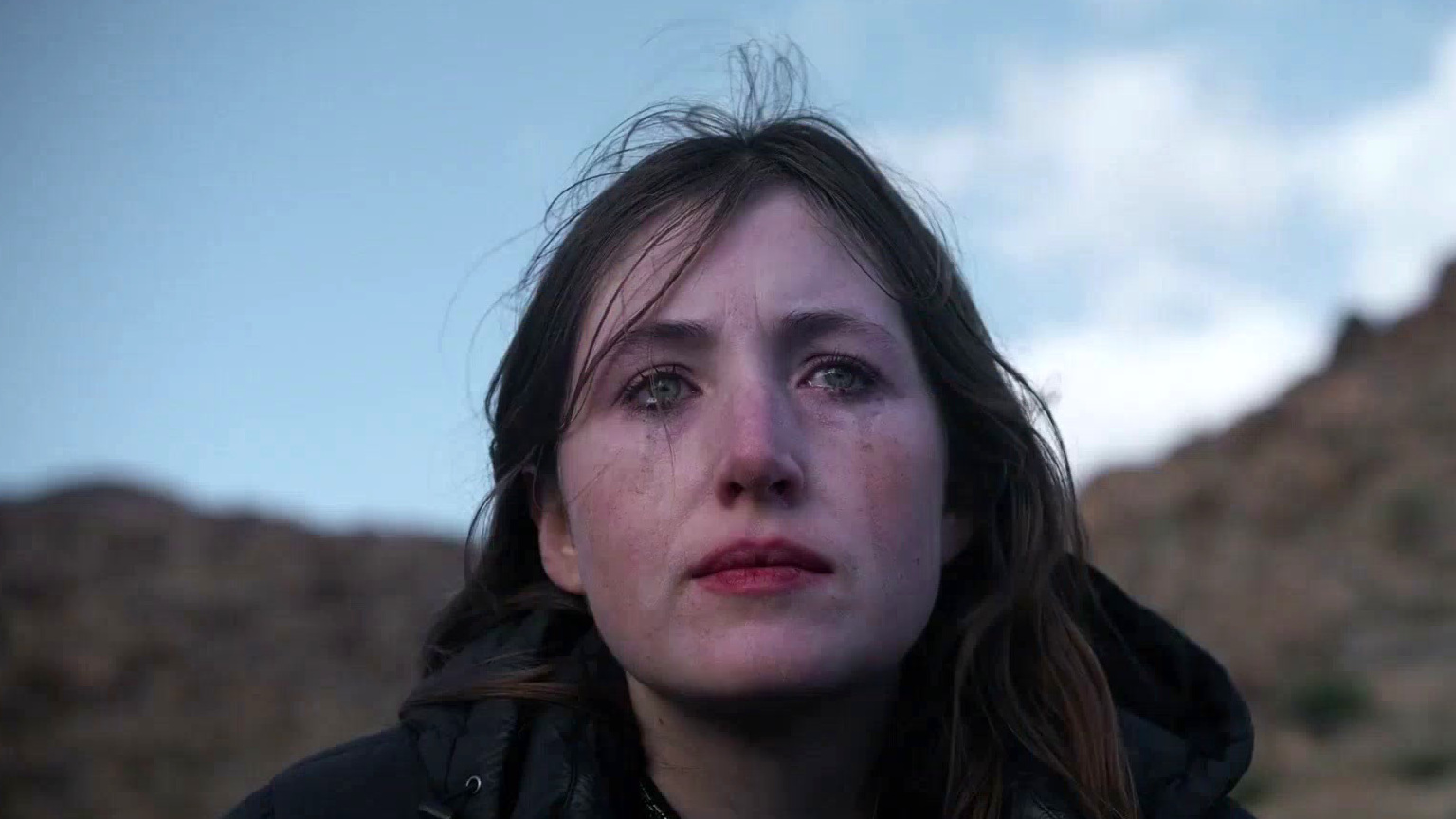Usually, at this time of year, I would be presenting a list of my favourite films of the previous year. In the past, I’ve created a separate Best Australian Films list and a combined overall Best Films List, both of which have highlighted the movies that I perceive to be the most notable of the year. This year, as I wrap up my coverage of non-Australian films and transition to solely covering the Aussie output (read more about that here), I’m going to buck my own trend a little and highlight ten films that might not be appearing on your average ‘Best Films of 2020’ list*.
Filling in the gaps on that metaphorical list are the below ten films:
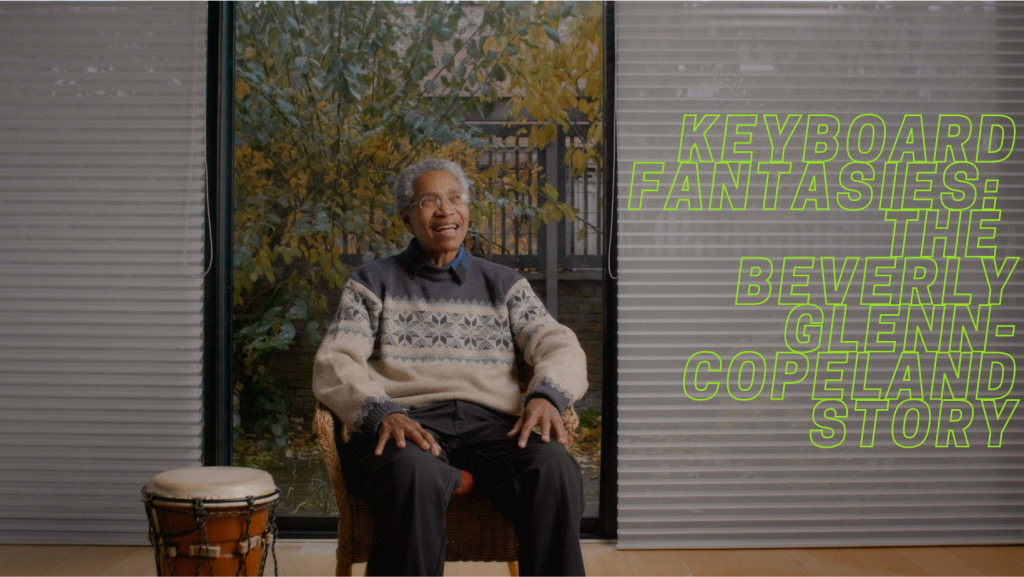
In a year drenched in tragedy, it was inevitable that we would all seek out something that provided an element of comfort and calm to make the day go a fraction smoother than we’d hoped. For me, that comfort came from an unexpected documentary called Keyboard Fantasies: The Beverly Glenn Copeland Story. Posy Dixon’s film follow Canadian trans-man Glenn Copeland’s music journey as an artist who has crafted the seminal album, Keyboard Fantasies, and its emergence from relative-obscurity into cult status.
Posy Dixon’s film compassionately reflects Glenn’s journey as a musician, tenderly culminating in a powerful moment where Glenn is supported and championed by his fellow LGBTIQ+ community as a queer elder. His journey is the young queer folks journey, and they are all keenly aware of that, and actively honour the struggles that Glenn has lived through and challenged. Yet, Keyboard Fantasies is not a film that wallows in grief, instead allowing the positivity of Glenn’s music to shine above all else. This is almost as obscure a film as the album Keyboard Fantasies borrows its title from, yet, don’t let that obscurity put the journey of discovery off for you, this is one of the most rewarding and calming films of 2020. I’m forever grateful of its existence and for its ability to ferry Glenn Copeland’s music into my life.
Read the Keyboard Fantasies: The Beverly Glenn-Copeland Story here.

We transition from calm and considered to grief-stricken and furious with Hylnur Palmason’s measured Icelandic drama, A White White Day. This explorative film details the lost grief of Inggimundur (Ingvar Sigurdsson with a torturously lived-in performance) as he moves through his fog-laden world, picking up the pieces after the death of his wife and partner, and the subsequent revelations of infidelity, all the while managing his impending retirement as a police officer.
Throughout 2020, the spectre of death and the realisation of mortality reached a heightened level of awareness and pronouncement in the world that it became an intoxicating, mind-numbing entity. Days flowed into one another, with time becoming an amorphous state that was both liquid and solid at once. As soon as March finished, November was here to cloud our minds. Emerging from that fog, and unveiling the emotional complexities that exist within it, sometimes needs some guidance, and it’s with A White White Day that I found the greatest guidance of all in a sequence where Inggimundur and his granddaughter, Salka (Ída Mekkín Hlynsdóttir), walk through a pitch black tunnel, yelling, screaming, and navigating their way through to the light. In many ways, that’s how we all collectively felt throughout the year, screaming for daylight.
A White White Day is not an oppressive film, yet, it is one that is hard to escape. At its close, where it transitions from a crippling conclusion into the credits, we find that we are not free from its grip, but instead burdened with the reality of grief and its enduring weight upon us. Through art, we can process our emotions a little better, and if you can sustain a dour film, then you ought to submit yourself to this magnificent feature.
Read the A White White Day review here.
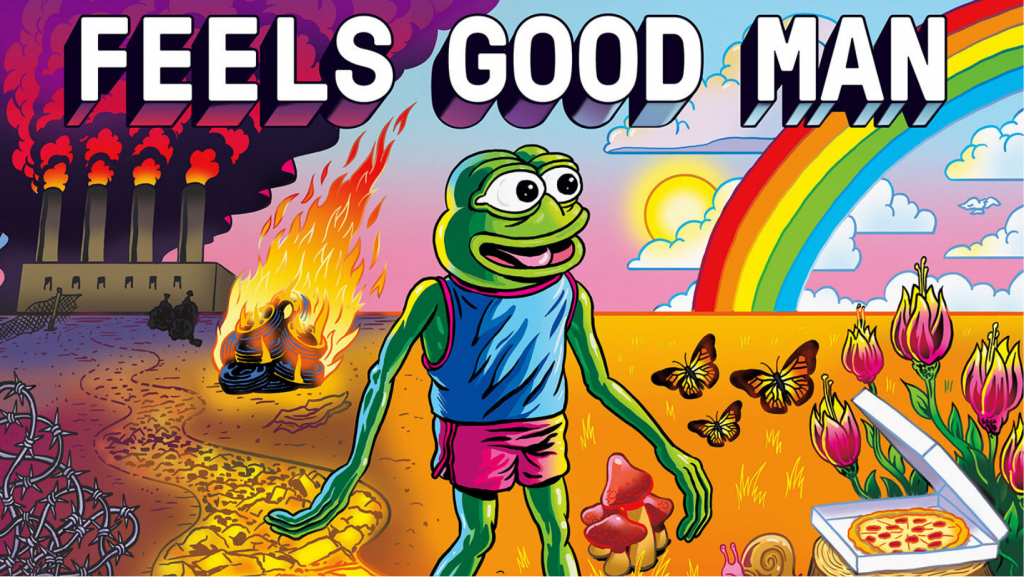
As the globe finds itself collectively watching America transition from a far right despot lead regime to a centrist government, wondering what destruction will be wrought in the wake of such actions, we can’t help but wonder and ask whether the new normal that will eventuate will be a more collegial and positive one. It seems apt then that, in some ways, we have a mild-template of what might happen as America battles to realign itself with its purported values in Arthur Jones excellent documentary, Feels Good Man.
We’re all familiar with the dopy-eyed frog called Pepe, who has transitioned from a charming little meme that has reflected how we’ve all felt into a symbol of hate and extremism. But we may be less familiar with the battle that artist, Matt Furie, went through to regain control of the narrative of Pepe the Frog, and eventually turned the tide against hate, transitioning the character back to the positive figure it once was. Feels Good Man takes its title from the comic strip that helped make Pepe the famous figure he is, all the while reflecting the laid-back nature of Furie and his friends.
I’m not going to suggest that this wonderful documentary is an exact replication of what will happen to America – far from it, the political complexities as well as the rampant inequality, both class based and racially, in America is far too substantial for this to reflect any impactful change – but rather, that even through hate speech and acts of violence, something can transition back to its core positive value. America might be too far gone, but one has to have hope, and it’s with a film like Feels Good Man that a little bit of that hope is instilled in my spirit going forward.
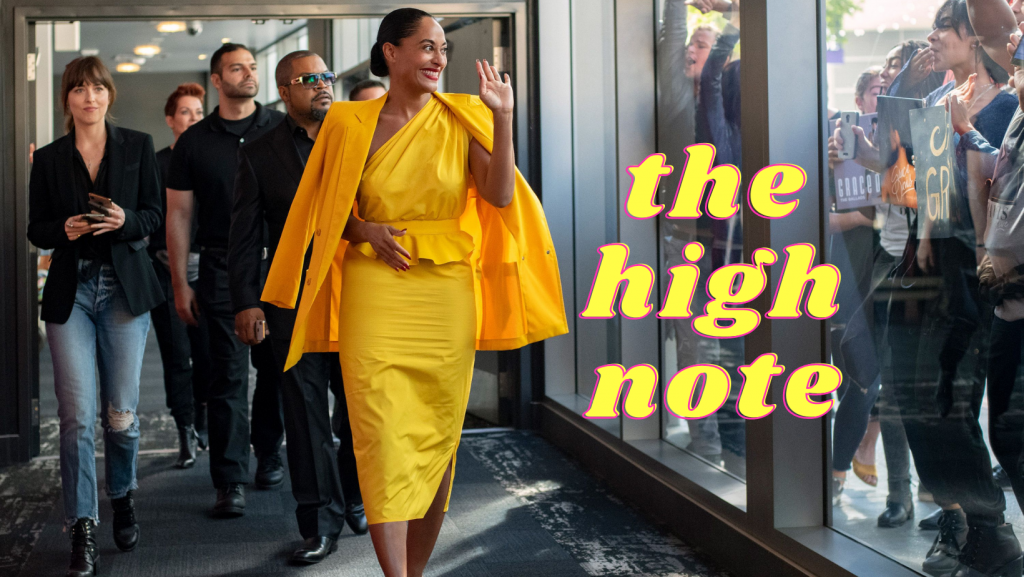
Like many films that tried to have a life at the box office, Nisha Ganatra’s absolutely joyous film The High Note came and went with nary a notice from audiences. I compared watching this film to the feeling of having an icy cold, refreshing beer on a searing hot day. It hits the spot and makes you feel good for just a moment.
Dakota Johnson stars as Maggie, an assistant to Tracee Ellis Ross’ music icon Grace Davis. Ross, the daughter of Diana Ross, stuns with an untapped vocal talent that should ideally secure her a musical role sometime in the future. Her Grace reflects the legacies of Whitney Houson, Beyonce, Aretha Franklin, and of course, Diana Ross, and Ross honours those legacies perfectly here. Johnson and Ross bounce off each other effortlessly, creating a harmonious on screen relationship that helps The High Note absolutely soar.
There’s something so joyfully refreshing about The High Note, with its radio-friendly soundtrack produced by Grammy-winner Rodney “Darkchild” Jerkins, and its adherence to genre-tropes, plus a keenly informed script by Flora Gleeson that give its main cast something genuine to work with. A great feel-good film seems like a rarity nowadays, but I’m beyond grateful that The High Note has emerged into the world, because damn, it’s downright brilliant.
Read The High Note review here.

With an outwardly absurd title, and a resplendently absurd name for its main character – Old Dolio (Evan Rachel Wood) –, Kajillionaire understandably slipped by the wayside of audience members around the world. Writer/director Miranda July is operating at her quirkiest, and also her most passionately empathetic, that, while not without its sad moments, is crammed full of positive infectious charm that makes Kajillionaire feel like the warmest hug ever.
Old Dolio is the emotionally arrested daughter of Robert (a looming loafish performance from Richard Jenkins) and Theresa (an almost unrecognisable Debra Winger, gracefully making her presence known on film once again). Together, the trio grift and swift their way through life as nefariously as they can, and as far under the radar that they’re almost somnambulistic. After a cross-continent ‘heist’ has them encountering Gina Rodriguez’s Melanie, the family is thrown into disarray, and Old Dolio’s understanding of who her parents are is transformed completely.
Miranda July’s script feels so devoutly unique and expressive that you can’t help but feel she spirited it out of the petrol station toilet block that exists in the centre of one of Kajillionaire’s grandest scenes, where Old Dolio’s mind is transformed in the galaxy of darkness in the toilet. That sentence may make absolutely no sense to those who haven’t seen the film, or may seem like a deterrent, but in fact, my heart is elevated from just thinking about that moment, and the giddy energy that thrives within Evan Rachel Wood afterwards. Her role here is quite possibly the finest of the year, and as the Oscar season kickstarts, it’s already clear that she’s been robbed for every award possible.
Kajillionaire is off-kilter and quirky in the best way possible, and just like The High Note, I know instantly that this will become a comfort film in no time.
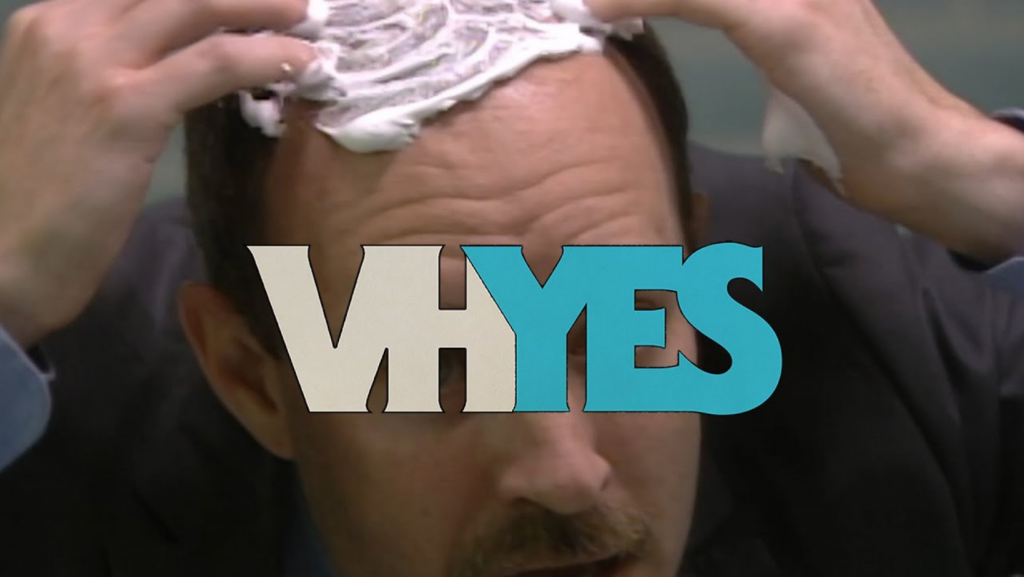
Jack Henry Robbins (son of Tim Robbins and Susan Sarandon) has created one of the most utterly bonkers, furiously manic films of the year with VHYes. At once, this is an ode to the eighties, with its VHS aesthetic masterfully manipulating the eras acidic political eccentricities and peak capitalism into a giddy rollercoaster of genre-debauchery. And yet, it’s also some of the finest modern sketch comedy woven into a narrative of a young kid recording over his parents wedding tape.
The breathy runtime of seventy two minutes exhilarates as much as it excites, kicking you from comedic high to horrific low and back to a lycra-clad exercise sequence. There’s a post-midnight mentality to VHYes, where you’re struggling to keep awake as 3am rolls along and your mind starts conjuring false memories of what you’re seeing. Is it real? Or am I just so out of my mind that I’m blitzing hallucination after hallucination? That in itself is the essence of the eighties, and Jack Henry Robbins cements that tone perfectly.
As I mentioned in my review, VHSYes feels like the kind of film that would have been handed around to friends via copied copies of VHS tapes in the nineties. There’d be a hush-hush tone when discussing it, and then when you found out a friend hadn’t seen it, there’d be a loud exclamation of you haven’t seen VHYes! Man! You gotta fix that!. It’s that kind of film.
Read the VHYes review here.

We’re in the golden era of documentaries, with more being produced than ever before, and even more shining light on the history of the world in a manner that is invitational and educational. In 2020, Sam Feder brought us the impressive documentary Disclosure, a grand, in-depth exploration of the depiction of transgender folk in films throughout the history, and the impact that the portrayals on screen have on the global trans community. With the support of Laverne Cox, Yance Ford, Bianca Leigh, Jen Richards, Tiq Milan, Lilly Wachowski, Nick Adams and more, Disclosure details in extreme detail the history of trans folk in media, from the start of the art of cinema, through to films like A Fantastic Woman and The Danish Girl.
Through talking heads and clips from films and TV shows, Disclosure highlights how trans folk have been portrayed on film with life experiences that are defined by tragedy and trauma, often with cisgender actors playing trans characters. This distinct ‘othering’ of trans folk worked to build a public perception through media where trans folk became subjects of pity and scorn. Additionally, Disclosure touches upon toxic tropes like the ‘bury your gays’ trope, where trans and queer folk are killed to further the emotional narrative of a main character. If there’s a minor complaint, it’s how minimal the non-binary side of casting is touched on here, with Asia Kate Dillon being the sole person mentioned, but given the focus is predominantly trans folk, it is mildly understandable.
Yet, lest I paint a picture of this being a lecture on film, Disclosure is profoundly invitational in tone, with Sam Feder reaching out to the audience and asking them to choose a better, more inclusive future for trans folk around the world. Additionally, this feels like the final statement and rebuttal when it comes to misguided and actively hateful arguments on the internet from people who say ‘it’s called acting’ whenever a cisgender person is cast in a trans role, and the LGBTIQ+ community reacts in kind. It’s not ‘just acting’, it’s active transphobia and it needs to stop. Watch Disclosure, and embrace an education about trans folk on screen.

Radha Blank’s rambunctious debut feature, The 40-Year-Old-Version, is not only one of the most outwardly entertaining films of the year, it’s also the main film I’m finding myself recommending to anyone and everyone who needs something to watch on Netflix. Writing, directing, and taking lead duties, Radha plays, well, Radha, a NY playwright who is nearing 40 and finding herself despondent with the world. The big break she was destined to have a decade ago never came, and while that hasn’t stopped her trying, it has forced to Radha to reconsider her future.
It’s here that Radha decides to reinvent herself as a rapper, going under the name RadhaMUSPrime. Balancing teaching and playwriting, Radha finds a vitality in her life through the art of rapping that wasn’t there before, leading her to embrace the 40-year-old-version of herself. Shot in stunning black and white, and carrying a devout socio-political streak too (the running commentary on gentrification is superb), The 40-Year-Old-Version is matched in quality and style by Radha’s stellar raps. Even if hip hop or rap isn’t your music genre of choice, you’ll still be struggling to get White Man with a Black Woman’s Butt out of your head come the end. Out a year full of barnstorming debut features, Radha Blank’s arrival on the scene sits right at the top. Bring on the oeuvre of Radha Blank, we desperately need it.
Content Warning: The final two films discuss death and dying.



Death was never far from our minds in 2020. Tragedy became a daily event, with the ever escalating global loss of life sitting precariously close to becoming a comfortable routine. Our notional mortality reached a disturbing level of political indifference at the years conclusion, where it was never more pronounced than when we saw footage of Trump playing golf while day after day America surpassed its death toll figures, effectively reliving the loss of 9/11 endlessly. As videos of Black Americans dying at the hands of police officers filled our social media channels, reinforcing the systemic racism of the ‘free’ country, we were further made cognisantly aware of how disposable the lives of Black Americans were in the eyes of the law. Elsewhere, public figures like Chadwick Boseman and Lynn Shelton were taken due to the cruel beast that is cancer.
These varied aspects of dying reminded how fleeting, cruel, pointed, and aggressive death can be. It can be an unseen entity, sweeping across the globe on the wind, claiming lives at whim, or it can be the hate-filled racist anger inflicted upon a community as a means of oppression and control. It is swift, or it lingers in the blood stream, taking its host bit by bit until they are no more. Prior to 2020, death felt like a taboo, but now, it feels like it is all we can talk and think about.
As such, it was hard not to approach ‘entertainment’ with death in mind. It was often ‘an escape’ from death, or films became a Rosetta Stone that might help us understand what on earth was going on. It can be a salve, giving you the emotional release that you might need to help break you out of your frozen state. In 2020, there were many films that explored the theme of death, with Pixar delivering two animated films that touched upon death with Onward and Soul, and the aforementioned A White White Day, presenting the reside of death, but there were two films in 2020 that presented the incline towards finality in unique manner: Amy Seimetz’s elegiac horror, She Dies Tomorrow, and Kirsten Johnson’s familial ‘documentary’ Dick Johnson is Dead.
With Seimetz’s masterful film, outwardly healthy characters are struck by the horror of knowing their death is imminent. In a prescient manner, Seimetz weaved together the most applicable horror film of the year, with a plague of the mind transferring from person to person as they each utter to one another ‘I’m going to die tomorrow’. Seimetz is less concerned with the resulting expiration, and more with how we each grapple with the knowledge that death is sooner than we anticipated. A film like She Dies Tomorrow forces us to recall our mortality on a daily basis, and a year like 2020 equally stabilised that mindset, and when combined, we are reminded that we need to not take each day we live for granted.
While Amy Seimetz presented a catalogue of characters who were aware of that they would soon die, Kirsten Johnson elevated her own father, Richard, into the pantheon of cinema via an exploration of the grip of dementia on the mind. Her mother disappeared under the fog of Alzheimer’s, a disease that spirited away the person she once knew, and left a shell of a human behind, and with that in mind, Kirsten wanted to help her father, and herself, work through the experience of dying.
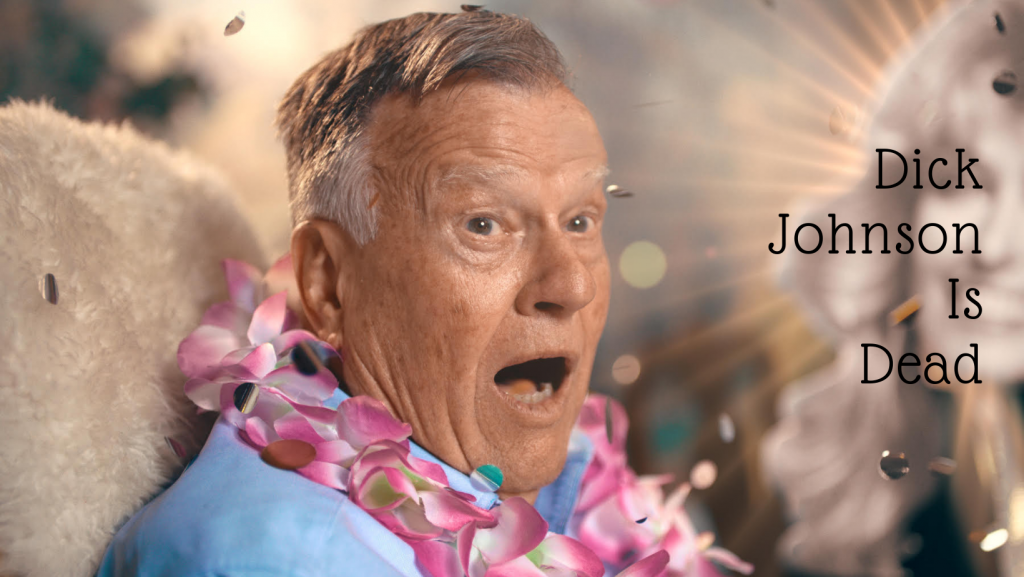


In Dick Johnson is Dead, Kirsten engages in the process of her father dying with his eager involvement. He acts out instances of death, from falling down a staircase, to having an air conditioner fall on his head, and then follows through with mock-funerals and a fantastical presentation of the afterlife. For Dick, a retired clinical psychiatrist, he understands the thematic exploration that his daughter is aiming for, and works alongside her to make it happen, often jointly employing a streak of black humour into the mix.
There’s a charm to Dick Johnson is Dead that disarms the dying process, much in the same way that dementia itself disarms its occupant of the awareness of their impending mortality. For Johnson, and for the audience, Dick Johnson is Dead provides a visual grieving process that encourages the mourning of friends of family while they are still here to mourn their life with. Living funerals have become an almost novelty, but there’s something powerful about honouring your loved ones while they are here to be honoured, and for them to see that they are loved too.
So often once death has done its deed, and the flurry of organisation and the chaos of bodily preparations take place, a funeral occurs. We are designated an hour or three to honour and mourn the person we are there to see, and then societally, we are forced back into our day to day lives. Dick Johnson is Dead suggests celebrating those we love right now, no matter how old they are. Sure, I’ve just described a birthday, but the reality is, we often take them for granted too.
Both She Dies Tomorrow and Dick Johnson is Dead reinforce the fragility of life, not that we needed reminding, and both encourage a celebration and tenderness of life while we are here. Amy Seimetz and Kirsten Johnson made these films prior to the pandemic, but their existence throughout 2020 made weathering a bad year just a touch easier. Thank you.
Read the She Dies Tomorrow review here.

